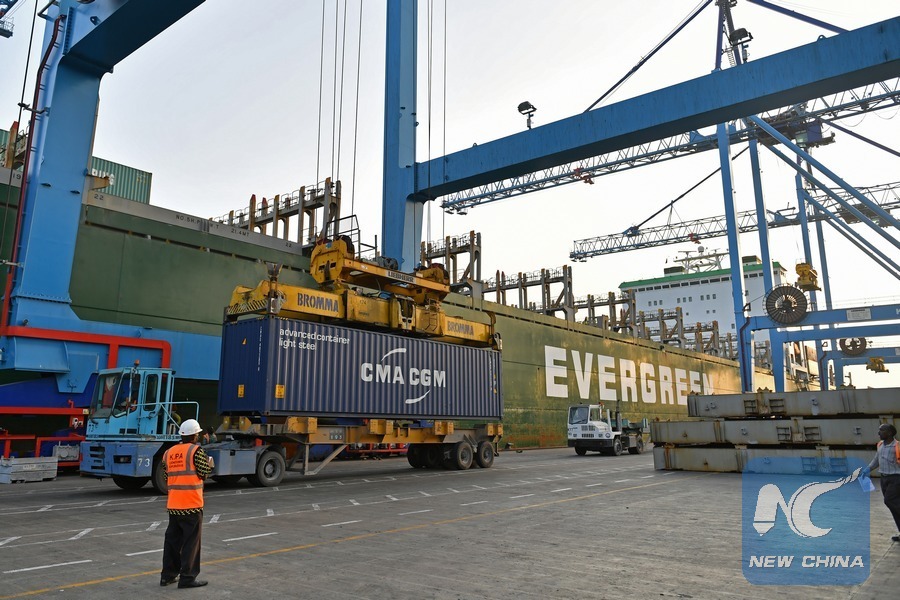
A container is unloaded from a ship in Mombasa Port, Mombasa, Kenya, in this file photo taken on Jan. 10, 2017. An agreement to launch the African Continental Free Trade Area (AfCFTA) was signed on Wednesday, thus creating the largest free trade area on the world's poorest inhabited continent. (Xinhua/Sun Ruibo)
by Olatunji Saliu
ABUJA, July 12 (Xinhua) -- With the African Continental Free Trade Area (AfCFTA) agreement launched into action, Africa and China can cement their already existing industrial production capacity cooperation, a Nigeria-based expert in international relations said in a recent interview with Xinhua.
Charles Onunaiju, who is also director of the Center for China Studies in the Nigerian capital, Abuja, said since there are framework and cooperation arrangements in place, there is an advantage for both partners to make the necessary advancement for African industrial capacity.
"I think there is a huge prospect in real possibilities in unlocking Africa as the next industrial frontier with the signing of that important document," the expert said. "But it cannot happen on its own, it must be facilitated, it must be driven through policy engagement."
The AfCFTA launch occurred on Sunday at the 12th Extraordinary Summit of the African Union (AU) Heads of State and Government in Niamey, capital of Niger.
Among its major aspirations, the AfCFTA calls for a single continental market for goods and services, with free movement of business people and investment. It also aims to eliminate tariffs among member states, create a market of 1.2 billion people with a combined gross domestic product (GDP) of more than 2.2 trillion U.S. dollars.
Some African leaders, including Nigerian President Muhammadu Buhari, had earlier expressed the opinion that Africa needs not only a trade policy but also a continental manufacturing agenda.
Onunaiju said that with Africa having a single market, what the drivers of the initiative and general stakeholders need right now is to put the right industrial policies in place and make effective some other key issues, including policy consistency, harmonizing policies and custom duties.
Likewise, there is a need for Africa to take advantage of the industrial prospects of the new free trade area which is the nitty-gritty for building a common market, he noted.
"We have to find convergence on key areas like industrial policies, policy alignment, policy networking. You can't have divergence policies, some of them openly antagonistic to each other, and you are talking about a free trade area. So, you have to create some synergies and convergences, if you want to really make the free market beyond rhetoric and slogan," he told Xinhua.
Enhancing industrial cooperation was among the ten major China-Africa cooperation plans proposed by China at the December 2015 Forum on China-Africa Cooperation (FOCAC) summit held in Johannesburg, while it was also part of the eight major initiatives rolled out at the September 2018 FOCAC summit held in Beijing, he recalled.
"I think if Africa seizes the moment... If Africa engages this process of industrial and capacity cooperation with China, a lot more creatively, it can go a long way to provide the industrial foundation that Africa needs," added Onunaiju, who has written several books on China-Africa cooperation.

